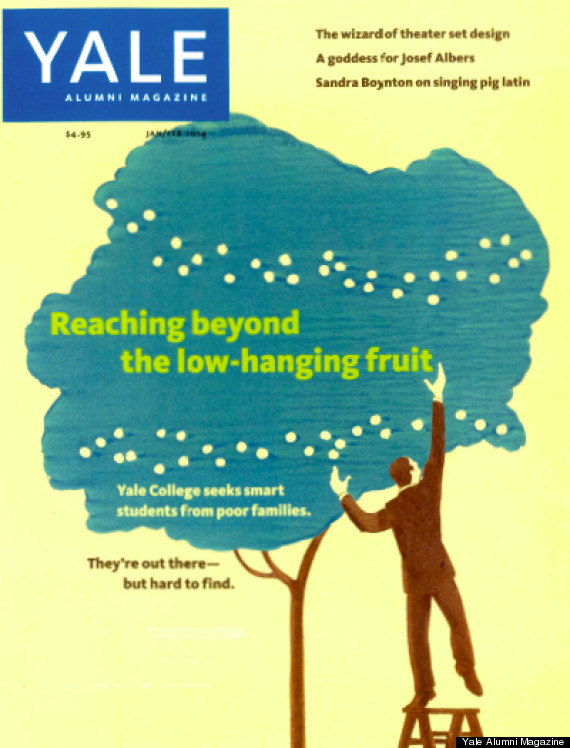The latest cover of Yale University's alumni magazine, which alleges that smart, poor students are "hard to find," has kicked up a controversy and forced an apology from the elite college.
The cover of the January-February issue of the publication features an image of a man in a suit picking fruit from a tree. "Reaching beyond the low-hanging fruit," the cover proclaims. "Yale College seeks smart students from poor families. They're out there -- but hard to find."
Here's the cover:

It wasn't long before the blowback began. Bloggers like Brooklyn College professor Corey Robin lashed out at Yale for suggesting that intelligent students from poor backgrounds are really that tough to locate. "If Yale was really having such a hard time finding smart kids from poor families, they should just come to one of my classrooms," Robin quipped.
Soon, major media outlets also took up the issue. The Atlantic noted that the magazine's choice of imagery equates poor students with pieces of fruit, which essentially makes them into "desirable consumer goods, rather than fully formed, intrinsically valuable human beings."
On Twitter, the issue gained steam, and users voiced their outrage.
Soon, Yale Alumni Magazine confronted the controversy, issuing a clarifying statement on its website. "How do you talk about class in a way that is clear, upfront, pithy, and interesting enough to be on a magazine cover?" the statement asked. "That was what we struggled with for the January-February cover story."
Addressing the criticisms over poor students being "hard to find," the magazine's statement continued: "We weren’t commenting on the numbers of smart kids who are poor -- but rather on the fact that Yale has to work harder to find and recruit low-income students, since they're unlikely to seek out Yale themselves. Clearly, we should have communicated that idea more fully."
It should be noted that the cover story itself, which was written by Yale graduate David Zax, does paint a more nuanced picture than the cover art implies. Attempting to show why smart college applicants from poor backgrounds might be more difficult for colleges like Yale to find, Zax's article draws primarily from a December 2012 paper published through The National Bureau of Economic Research and titled “The Missing ‘One-Offs’: The Hidden Supply of High-Achieving, Low-Income Students.".
From Zax's cover story:
[The study authors] write that “the vast majority of very high-achieving students who are low-income do not apply to any selective college or university.” These students “come from districts too small to support selective public high schools, are not in a critical mass of fellow high achievers, and are unlikely to encounter a teacher or schoolmate from an older cohort who attended a selective college.”
Zax goes on to write that "[i]t simply doesn’t occur to them, or they fear it will be too expensive -- when in fact, in all likelihood, it might be free," referring to Pell grants that provide funding for low-income students to attend colleges.
The student bodies of many of America's best colleges are disproportionately from wealthy families. As The New York Times pointed out last year, a study from Georgetown University found that only 14 percent of students at the country's best colleges come from the lower 50 percent of families by income.
Political theorist and blogger Matt Bruenig suggested that the issue Yale's cover dredged up is part of a much bigger societal problem than can be pinned on one school.
Writing for Demos Policy Shop, Breunig pointed out that there may be real differences in academic proficiency between students in upper and lower classes. "That suggests we need to create a much more egalitarian society, one where there are not poor kids who suffer the kinds of deprivations that put them so far behind," Breunig wrote. "Pretending there is little or no class disparity in aptitude and that this is all some kind of college admissions thing, as many do, is ignorant and unhelpful."